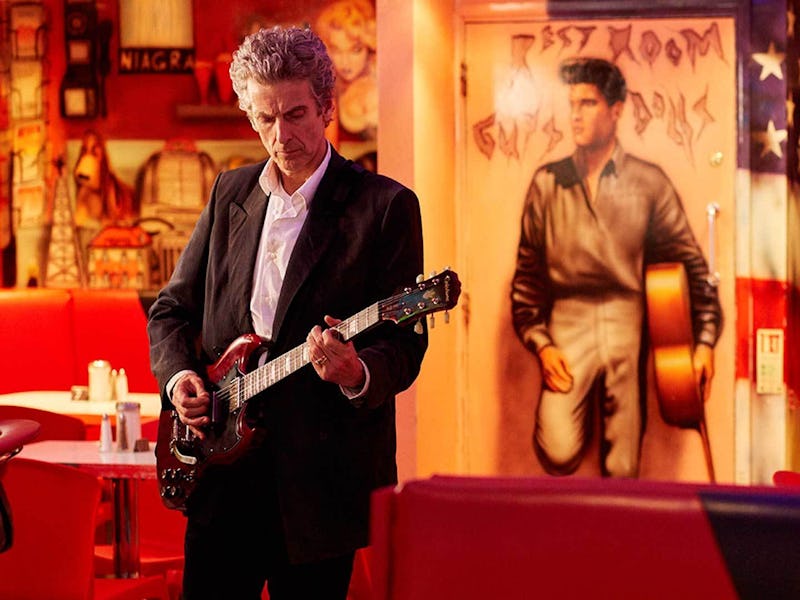The 'Doctor Who' Finale, "Hell Bent," Sets Up the Show to Change Formats
Was it a sign of a major restructuring? Or is Steven Moffat just being Steven Moffat again?

If the finale of Doctor Who made one thing clear, it’s this: Steven Moffat is gonna be Steven Moffat, whether you like it or not. In the previous two weeks, we’ve seen Clara die, the Doctor flip his shit, then age 2.5 billion years while punching through an unbreakable wall, all to declare hybrid war on Maisie Williams’ Me and his fellow Time Lords. By the end of “Hell Bent,” we find that Clara lives…well, sort of lives, the Doctor was playing the long game the whole time and really isn’t that mad at Gallifrey after all, and we still don’t know for sure who this terrible hybrid destroyer of worlds is supposed to be.
From one side, the episode was very sweet: It was more or less an ode to Clara, fitting for a companion who spent the better part of four seasons saving the Doctor’s bacon. This episode wasn’t about revenge on the Time Lords after all, but the Doctor’s love for her. He spent two-and-a-half billion years doing the Gallifreyan version of The Shawshank Redemption for her. He returned to his home planet and orchestrated a Time Lord coup for her. He was literally willing to destroy the whole of space and time to save her.
It was a touching send off to Jenna Coleman’s Clara character, and no one can accuse Moffat of not knowing how to tug on Whovian heartstrings. Yet as awesome as “Hell Bent” was, the ending felt cheap. Yes, it’s cool to think that Clara and Me are floating around the space-time continuum in their own big blue ‘50s-era diner. I know I for sure let out a shriek of Whovian fanboy joy when the Doctor jacked the old-school TARDIS. And thank the Papal Mainframe the Doctor finally replaced those damned sunglasses with a proper sonic screwdriver.
But the ending was peak Steven Moffat in all his “It’s because timey-wimey, that’s why! Now hush up with all the silly questions and enjoy!” glory. The Doctor pulls Clara out of her timeline a heartbeat away from death and then decides the only way she can survive without being hunted down by his fellow Time Lords is by erasing her memory. Clara, being Clara, reverses the process, which results in a very dramatic game of memory wiping Russian roulette.
The concept of memory loss somehow preventing Clara from being tracked by angry Time Lords doesn’t make a lick of damn sense. By completely erasing Clara from the Doctor’s memory, it’s like the past four or so years never happened. Or rather, the events still took place, but there are just these giant Clara-Oswald-sized blind spots in the Doctor’s memory that he, the semi-omnipotent Lord and Master of Time and Space forensics, just calmly shrugs off as the cost of doing Time Lord business. Even for a show based on a now 2.5 billion-year-old waistcoat-festooned alien chap flying through the universe in a time-traveling police box, this strains credulity.
The going line is “The Doctor hates endings,” but really that is Moffat himself talking. From the standpoint of a show-runner, it’s a shrewd device. Any character who isn’t killed off can potentially come back at some point. From a writing standpoint, this is the ultimate in playing both sides: the Doctor can simply start fresh for Season 10, but there is always the chance, no matter how small, that Clara returns and helps the Doctor dig up their forgotten past. Whether that actually happens or not is irrelevant. Just ask Captain Jack.
One of the criticisms of the Moffat era has been that the grandiose multi-season story arcs are perhaps a bit too complicated. Rumors have burbled for a couple years now about either a change back to the classic four-part serial format or even going from a dozen 45-minute episodes to four or five 90-minute mini-movies à la Moffat’s Sherlock series.
The benefit of a series of standalone vignettes gives Moffat the room to be as Moffat as he wants to be. He can answer all kinds of questions with more questions, clean the slate whenever he likes, and do all the wibbly-wobbly-timey-wimey Moffat things, with even less expectation of plausible explanations. Maybe a fresh reset is just what the show needs, and maybe making this not-so-clean-break will act as launching pad for a completely new format. The Doctor ends Season 9 completely unattached, so if the show’s writers were going to switch back to the four-part serial format, this would be a great time to do it.